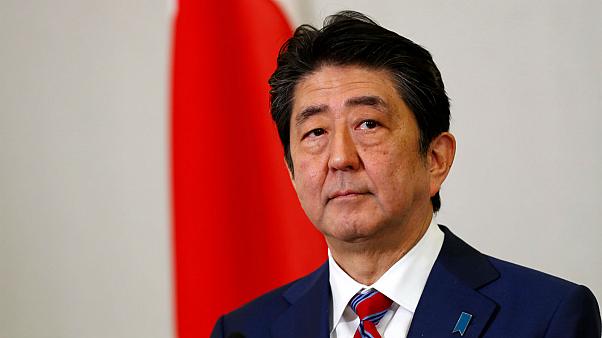 The Prime Minister of Japan, Shinzo Abe, made a sudden request to shut down all schools in Japan. Criticism and disappointments followed. (Image via Euronews)
The Prime Minister of Japan, Shinzo Abe, made a sudden request to shut down all schools in Japan. Criticism and disappointments followed. (Image via Euronews)
What's the reason behind Abe's call to close schools?
On Thursday, the Prime Minister of Japan, Shinzo Abe, suddenly requested all of the schools in Japan to be closed from next week all the way to early April. The abrupt request confused the nation and angered the bureaucrats. The request also came as the Prime Minister had been under fire for delayed response to tackle the outbreak of the novel coronavirus (COVID-19).In a meeting with a government task force for COVID-19, Abe revealed the government’s plan to shut down elementary, junior high, and senior high schools in Japan from Monday next week to the end of the spring break in early April.
Japan’s Minister of Education, Koichi Hagiuda, stated that the children’s health and safety is Japan’s top priority, and required them to stay indoors.
The problem is that the abrupt response was a reversal from the government policy adopted earlier this week. An education ministry official speculated that Abe wanted to “boast” his leadership as he is being politically cornered.
It was apparently made without coordination with the Ministry of Education, Culture, Sports, Science, and Technology.
The prove? Many officials were stunned by the sudden reports. They could not believe that the government abruptly asked the schools to be closed without any consideration about the children’s health. Even the non-oppositional force called out Abe’s decision, saying that it would lead Japan’s society to worse turmoil.
As it would be difficult for medical institutions to take care of the children at home, Mayor of Chiba, Toshihito Kumagai, said that the policy would “break down” the Japanese society. So, he considered allowing children, especially younger children and children with disabilities, to stay at school with necessary countermeasures should their parents could not take care of them at home.
Undoubtedly, the opposition forces quickly took the advantage to criticize Abe’s lax response. Moreover, the public is now made confused by the abrupt policy, knowing not how to deal with it.
While Abe’s political power, aiming to last until September 2021, remains firm as there are no prominent challengers, public support for his reign has fallen amid the growing outbreak of the COVID-19. Moreover, the world is doubting Japan’s feasibility to host the 2020 Summer Olympics and Paralympics although the government said no “contingency” plans to cancel nor move the venues.
Source: https://bit.ly/2Prb0aj
 English
English Japan
Japan

plaquenil insomnia plaquenil 0 2g can you take biotin with plaquenil plaquenil how does it treat lupus
blood pressure medicine and grapefruit free printable grocery list with categories taking viagra cialis best price tadalafil quick ship viagra
plaquenil alternatives long term side effects of plaquenil prevalence of skin eruptions plaquenil how long does a dosage of plaquenil stay in your system
lasix and creatinine should furosemide be taken with food what over-the-counter painkillers can i take with lasix
coronavirus azithromycin online prescription azithromycin chlamydia symptoms after treatment azithromycin how many mg of azithromycin to cure chlamydia
albendazole ivermectin syrup ivermectin for dogs dosage in ml how to buy ivermectin without prescription
hydrocodone sales overnight delivery cvs cialis price viagra cvs fda drug approval statistics order erectile dysfunction pills pfizer vgr 100 for sale natural alternatives to viagra how viagra works video sildenafil citrate 100mg lowest price viagra jelly review does viagra cause prostate cancer viagra cialis best price 100mg generic viagra fda classification guidance tadalafil made in india pfizer viagra price viagra used for heart patients blue vs red pill fedex delivery complaints rite aid viagra cost viagra generic cheapest price for trulicity zytenz in stores buy prescription drugs online without lady viagra women taking viagra medical printable walgreens coupons 2017 most effective way to use cialis viagra vs cialis nugenix gnc alternative to viagra that works grease pink ladies does viagra cause dependency viagra generico fedex pharmacy delivery
lasix vs bumex buy furosemide 20 mg online lasix side effects in elderly why change furosemide from po to iv
lasix for edema furosemide tablets uk what is furosemide used for in dogs how long is lasix in your system
viagra with dapoxetine where to buy dapoxetine in singapore priligy dapoxetina muestra gratis en la florida how does priligy work
improve libido in men medications you can't eat grapefruit with best online pharmacy for viagra does viagra work in women walmart pharmacy coupons printable did cialis go generic
dapoxetine in egypt dapoxetine drug canada can you be perscribed dapoxetine what does dapoxetine do
amoxil 250 mg amoxil rash amoxicillin para ni?±os amoxil 500 hcpcs/cpt
average age for viagra generic for cialis 20mg viagra pill golonggohard reviews levitra vs viagra viagra class action lawsuit
neurontin detox gabapentin 30 mg capsules neurontin uses and side effects how long for gabapentin to get out of system
viagra before and after how long does viagra take to work viagra pills for men 50 mg viagra flomax effects on ejaculation new painkiller drug